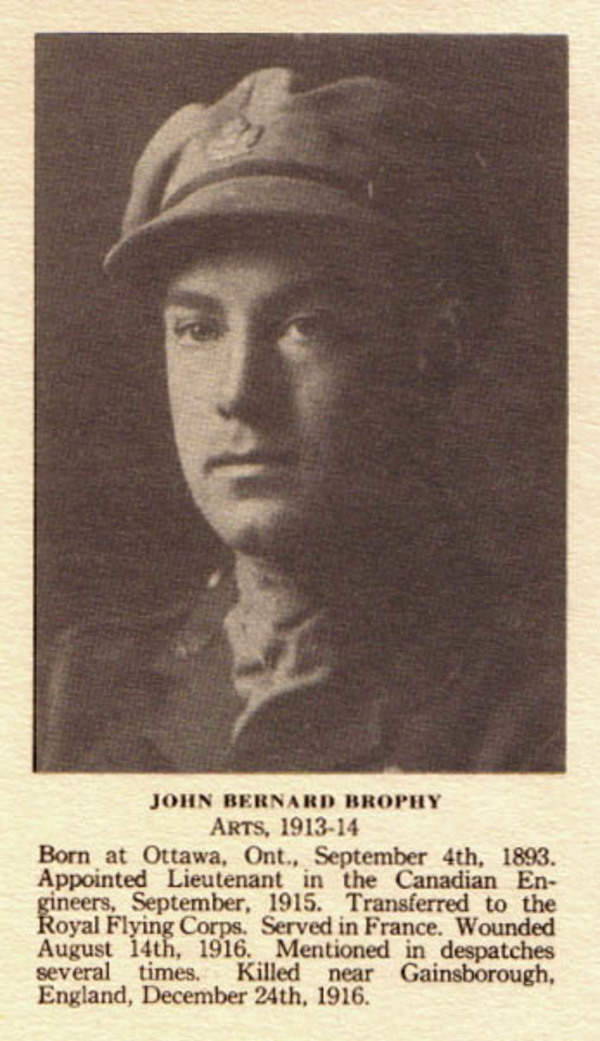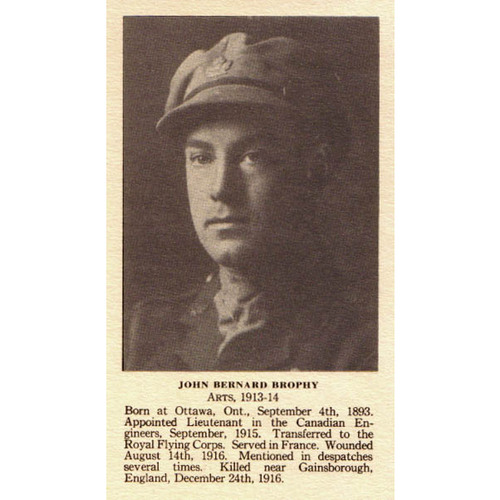
Source: Link
BROPHY, JOHN BERNARD (Don), athlete, air force officer, and diarist; b. 4 Sept. 1893 in Ottawa, son of John Byrne Brophy, a civil engineer, and Elizabeth (Ella) Hearn; d. unmarried 24 Dec. 1916 near Kirton in Lindsey, England.
Raised in an Irish Catholic family, John Bernard Brophy attended St Patrick’s School in Ottawa, where he excelled. At Ottawa Collegiate Institute his academic standing dropped as his athletic reputation rose: he scraped through while representing the school in several sports, including football, hockey, baseball, and track. In his senior year Don, as he became known, was the champion all-round athlete.
Despite his academic weakness, in 1913 he was courted for his talents in football by McGill University and the University of Toronto. He chose McGill and immediately made its varsity team. After failing his first year, he returned to Ottawa, took a menial job with the Department of the Interior, and played for Ottawa in the Interprovincial Rugby Football Union. There was talk of his attending the University of Toronto, but the outbreak of World War I in August 1914 presented an attractive alternative. For romantics of his generation, war was sport writ large. War in the air seemed like the ultimate sport, and Brophy decided to become a military aviator.
Canada did not have its own air force. The British government began to recruit potential pilots here in the spring of 1915 under a scheme whereby candidates were required to qualify privately before being commissioned in the Royal Naval Air Service or the Royal Flying Corps. Brophy enrolled at the Curtiss Aviation School in Toronto, but his name did not come to the top of the waiting-list until October. Although winter brought flying to a stop, before he could graduate, there was a great demand for pilots. Candidates who had shown sufficient aptitude were commissioned and shipped to England to complete their training. Second Lieutenant Brophy was among them, and when he left in December he began to keep a diary.
Awarded his wings on or about 18 April 1916, Brophy joined 21 Squadron of the RFC near Hesdin, France, on 6 May and flew operational flights from 26 May to 10 November. By that time the vital military importance of air forces had been fully recognized. Brophy was credited with bringing down one enemy aircraft, probably destroying two others, and forcing down a fourth, successes that earned him a mention in dispatches. During his six months with the squadron, it lost 19 airmen (killed or wounded) and, by Brophy’s count, another 6 became so neurotic they had to be posted out. Overdue for a rest, in November Brophy was sent back to England to join 33 (Home Defence) Squadron. He died on 24 December in a flying accident when his BE 12 failed to recover from a loop.
Brophy’s diary, which he had kept from 8 Dec. 1915 to 12 Nov. 1916, is one of only two known diaries written by Canadian airmen during the war, and the only one relating to the Western Front. Like sport, combat flying was a matter of will-power and hand and eye coordination, and life in the RFC was not unlike Brophy’s time on the field and in the locker-room. His diary reflects this similarity, but after he had reached squadron service, his tone changes: the deaths of men he must have known are not mentioned, and his earlier enthusiasms gave way to both complaints about the number of missions he had to fly and half-acknowledged fears of being posted out for lack of nerve. Occasionally he resorted to bravado and pseudo-biblical language to lift himself over underlying tensions which he may not even have recognized. Brophy’s nerves nevertheless held: his brief leaves were enjoyed, and, until December 1916, his missions were endured.
Brophy’s diary is reproduced in A rattle of pebbles: the First World War diaries of two Canadian airmen, ed. and intro. Brereton Greenhous (Ottawa, 1987). The original manuscript is in his papers at NA, MG 30, E370.
AO, RG 80–2-0-375, no.4831. Lisgar Collegiate Institute (Ottawa), Lisgar archive.
Cite This Article
Brereton Greenhous, “BROPHY, JOHN BERNARD (Don),” in Dictionary of Canadian Biography, vol. 14, University of Toronto/Université Laval, 2003–, accessed December 31, 2025, https://www.biographi.ca/en/bio/brophy_john_bernard_14E.html.
The citation above shows the format for footnotes and endnotes according to the Chicago manual of style (16th edition). Information to be used in other citation formats:
| Permalink: | https://www.biographi.ca/en/bio/brophy_john_bernard_14E.html |
| Author of Article: | Brereton Greenhous |
| Title of Article: | BROPHY, JOHN BERNARD (Don) |
| Publication Name: | Dictionary of Canadian Biography, vol. 14 |
| Publisher: | University of Toronto/Université Laval |
| Year of publication: | 1998 |
| Year of revision: | 1998 |
| Access Date: | December 31, 2025 |



